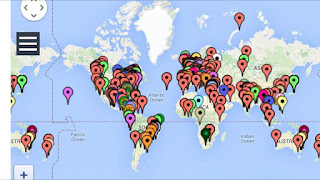A very interesting piece written by Jessica Xiao, one of our Community Facilitators. She speaks about some participants, teams, and facilitators.
McGill “GROOC” Changes the Face of Online
Learning
A short two weeks after launch day, McGill
University’s Social Learning for Social Impact GROOC (a MOOC for groups), is
already proving to have far-reaching implications for the future of online
learning. It pioneers a highly self-aware pedagogy designed to combat the
challenges of distance teamwork and dispels the idea that academia must be
detached from reality—in this GROOC, course participants form teams and
collaborate through a process of experiential learning of six sessions
(Engaging, Co-Creating, Designing, Scaling, Resourcing, and Assessing) that
brings them closer to débuting their own social initiatives in the seventh
session’s “Impact Gallery.”
There are currently over 6800 students
registered with 10 percent who have already formed or join a team in topics
ranging from arts and culture to education and economic equality, environment
and health to unconventional and out-of-the-box. Participants are strongly
motivated by a number of passions:
·
“…I’ve spent much of my career
studying the behavior of consumers and I’m curious to identify ways of turning
such a robust force into positive change.” – Dan Walls, Design Director at KNOCK, Minneapolis, USA
·
“…Soon, I’ll be working on a
thesis about how to empower social networks to maximize the effects of social
initiatives…” – Alejandra Talavera, Public
Relations Volunteer at World Vision, Peru
·
“I am from syria living as
refugee with my family since 4 years in iraq. i am trying to set up a school
for the children in the camp between the syrian and iraqian border. [sic]” – Khaniwar Ali (Save the Syrian Refugees in Iraq team)
·
“I’m originally from Slovakia,
but am currently working as a lawyer for the National Agroforestry Union in
Costa Rica.…I would like to spread a new wave of environmental peace around the
globe.” – Lubi Guindon
·
“In June of this year, I
resigned from a wealth management firm, where I worked as a sales executive for
ten years.…I am still in the for-profit sector, at least for today. And what
I’m trying to do is change ‘for profit’ to ‘for profit and for good.’” – Bjorn
·
“I joined this organization
with the passionate belief that by galvanizing a community of supportive
Canadians, we can transform our collective efforts into a powerful social
movement.” – Jeff Moat, Partners for
Mental Health, Canada
·
“I have an interest in
transforming societal views about crime and violence, and want to have a
serious, informed debate on these subjects so that we can look for real,
non-violent solutions for people who are suffering.” – Edgardo Amay, advisor on criminal justice and public safety for the
government of El Salvador
Another key component to students’ success
is the appointing of volunteer facilitators trained to foster community and
provide guidance to ensure students are participating at their level of
engagement and ability. Facilitators range from advanced university students
passionate about social issues to
experienced practitioners working in the plural sector who volunteer for a
multitude of reasons, as evident in their bios for the course:
·
“I’m very curious about
community building, on and offline. I’m excited to be a member of the McGillx
Social Learning for Social Impact GROOC MOOC facilitator team and look forward
to learning from, and supporting, this amazing global network of change
makers.” – Deborah Hinton, Partner
at Hinton and Co., mentor to Myko, Turning Point Montreal, and Le Salon 1861
·
“Being raised in Colombia and
having cross-cultural communication skills drag me to have special interest for
social initiatives towards the developing world. I am passionate about working
in team environments where we can all learn from each other; always aspiring
that the only and greatest possible outcome is to become a better version of
ourselves to offer our surroundings.”
– Laura Cardenas, industrial
relations student at McGill University
·
“As
she is constantly balancing herself between being a bookworm and a scientist,
she seeks ways and platforms where the combination of information literacy and
science technology can benefit the society at various levels.” – Yingshan Gu, recent masters graduate
from McGill University’s Library and Information Studies
·
“Having
spent most of his life in Nigeria, Charles was directly impacted by Massive
Open Online Courses and thus feels honoured to be a part of delivering quality
education to the world through the Social Learning for Social Impact GROOC.” – Charles Onu, Jeanne Sauvé Fellow and
founder of Ubenwa
Perhaps key to
understanding the personality of this course is within Desautels Faculty of
Management professor and head creator of the GROOC Henry Mintzberg’s reaction to
participants who want to create a team larger than the max 10 allowed: “You can
beat us, the whole idea is to beat us….Beat the system….We can plot with you to
beat the system.”




